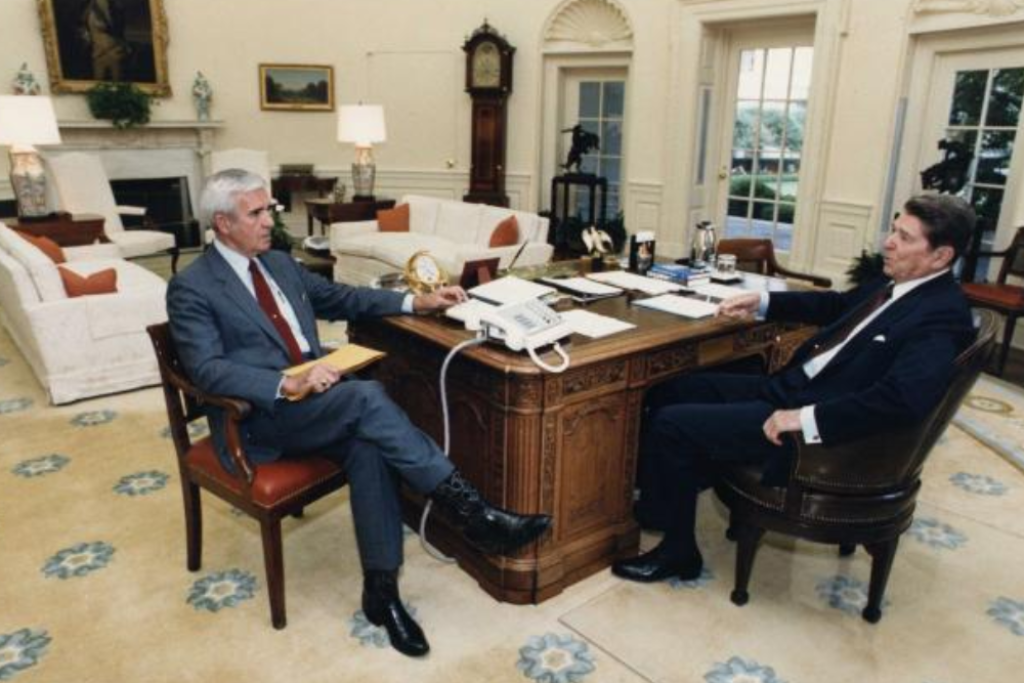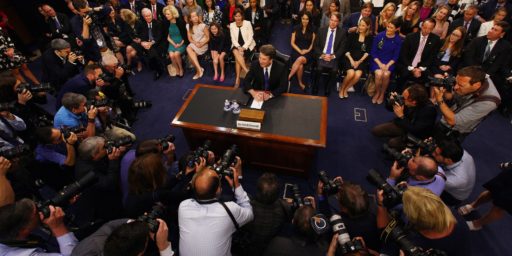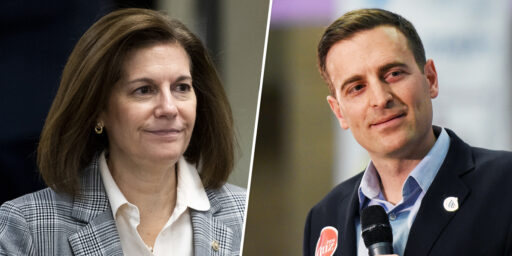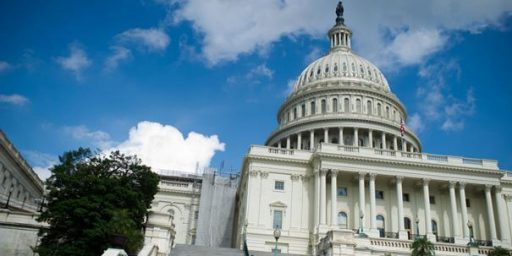Paul Laxalt, Former Nevada Senator And Reagan Confidante, Dies At 96
Paul Laxalt, the former Nevada Senator who was one of President Reagan's closest confidantes outside the White House, has died at 96.

Paul Laxalt, the long-serving Republican Senator from Nevada who was one of President Reagan’s closest allies and friends in Washington both before and during his Presidency, has died at the age of 96:
Paul D. Laxalt, a United States senator and close friend of Ronald Reagan’s whose insights aided his presidential campaigns and presidency, died Monday in McLean, Va. He was 96.
Mr. Laxalt’s family said the death was from natural causes.
As governor of Nevada from 1967 to 1971, Mr. Laxalt got to know Mr. Reagan when he was the governor of neighboring California, and they worked together to clean up the increasingly polluted Lake Tahoe. When Mr. Reagan ran for president in 1976 and 1980, Mr. Laxalt was his campaign chairman, and he served as general chairman of the Republican National Committee during the Reagan presidency. In private, he continued to address the president as “Ron.”
As a Republican senator from Nevada from 1975 to 1987, Mr. Laxalt was known for a firm conservatism conveyed courteously. When he led the unsuccessful 1978 fight against the treaties turning over the Panama Canal to Panama, for example, he did not insult or ridicule the Panamanians, as many of his allies did.
“How could I, as a French Basque?” he said in a 2006 interview, recalling his understanding of the Panamanian feeling that they were oppressed by a big power. Still, he insisted in 1978: “It’s absolutely essential that we retain the canal for security purposes, or else it might become a Russian choke point.”
Mr. Laxalt was born in 1922 in Carson City, Nevada’s tiny capital. His parents were immigrants from the Basque region of France, and his father was a sheepherder, spending months with his flock in the Sierra Nevada, while his mother ran a family-owned hotel renowned for her cooking in Carson City.
After service as a medic in the South Pacific (he called that typical Army wisdom, since he had fainted at the sight of blood), he got a law degree from the University of Denver Law School in 1949 and the next year won election as district attorney for Ormsby County, Nev. He never lost a case but did not enjoy prosecuting, and stepped down after one term.
He was elected lieutenant governor in 1962. Running for the Senate in 1964 as a supporter of Barry Goldwater and a critic of the federal government, he almost survived that year’s Democratic landslide. He lost to the incumbent, Howard W. Cannon, by 48 votes, but won the governorship two years later.
In that office, he stabilized the state’s gambling industry, then heavily mobbed up. Howard Hughes came into Nevada to own hotel casinos (though Mr. Laxalt talked to Mr. Hughes only by telephone, never in person). As governor, he also developed a system of community colleges.
In 1974, in another Democratic year, Mr. Laxalt was the only Republican to take a Democratic Senate seat.
After Mr. Reagan asked the freshman senator to chair his campaign in 1975, Mr. Laxalt had the ticklish job of advocating Mr. Reagan’s candidacy without attacking President Gerald R. Ford. He argued that Mr. Ford was not a bad president but that Mr. Reagan would be better.
In a campaign in which most of the Reagan staff was far younger than the candidate, Mr. Laxalt provided encouragement and counsel from his own generation, and urged Mr. Reagan to discard his note cards and speak from the heart, the tactic that made him a winner for the first time in the North Carolina primary, the seventh of the 1976 campaign.
Other key bits of advice were for Mr. Reagan to work harder at the beginning of the 1980 campaign, to go ahead and debate Jimmy Carter that fall and to suggest Howard H. Baker as a new chief of staff in 1987.
But perhaps his most important service was a trip to the Philippines in 1985 to warn President Ferdinand Marcos that the United States thought he was losing control. That was followed by a Feb. 25, 1986 telephone conversation that persuaded Mr. Marcos to leave office rather than fight a civil war with backers of Corazon Aquino, who had won an election Mr. Marcos then stole from her.
“I think we avoided a civil war with one phone call,” Mr. Laxalt said in 2006. “The phone call that persuaded him to get the hell out of town really made the difference. A lot of Filipinos would have died there in Manila that day.”
More from The Washington Post:
Paul D. Laxalt, a Republican governor and two-term senator from Nevada who, as one of Ronald Reagan’s most influential advisers and Capitol Hill allies, was dubbed the president’s “First Friend,” died Aug. 6 at a hospital in Reston, Va. He was 96.
The death was confirmed by Tom Loranger, a family spokesman. Mr. Laxalt suffered a debilitating fall in 2012.
Mr. Laxalt, the son of immigrants, often called himself a “Basque sheepherder’s kid.” That folksy description masked a fierce ambition and political savvy that made him a popular governor in the late 1960s and a national player later in his career.
In 1974, he was the only Republican to win a Senate seat previously held by a Democrat in the post-Watergate anti-GOP wave that year. In Washington, Mr. Laxalt was known primarily as a key opponent of the Panama Canal Treaty and as an early and enthusiastic cheerleader for a potential Reagan presidency. The two men, governors of bordering states, shared a brand of self-reliant, western conservatism.
Mr. Laxalt chaired Reagan’s unsuccessful insurgent campaign in 1976 against President Gerald Ford, a fellow Republican. The morning after former Georgia governor Jimmy Carter beat Ford in the general election, Mr. Laxalt encouraged Reagan to try again for the White House four years later.
Mr. Laxalt went on to chair Reagan’s victorious White House campaigns in 1980 and 1984. Despite his status as a junior senator, he saw his clout rise exponentially through his presence at key White House meetings. Time magazine proclaimed him “suddenly one of the most powerful men in Washington.”
Mr. Laxalt chaired Reagan’s unsuccessful insurgent campaign in 1976 against President Gerald Ford, a fellow Republican. The morning after former Georgia governor Jimmy Carter beat Ford in the general election, Mr. Laxalt encouraged Reagan to try again for the White House four years later.
Mr. Laxalt went on to chair Reagan’s victorious White House campaigns in 1980 and 1984. Despite his status as a junior senator, he saw his clout rise exponentially through his presence at key White House meetings. Time magazine proclaimed him “suddenly one of the most powerful men in Washington.”
Within the White House, Mr. Laxalt became a gatekeeper to Reagan and a backchannel emissary on delicate matters. He was reportedly tasked with telling James G. Watt, Reagan’s embattled interior secretary, to step down in 1983.
His most dramatic moment on the world stage involved the Reagan administration’s efforts to persuade the corrupt and autocratic Philippine President Ferdinand Marcos to make democratic reforms or step aside.
American support for Marcos tumbled after opposition leader Benigno Aquino Jr. was slain in 1983 after returning to Manila from exile in the United States.
The senator traveled to the Philippine capital in late 1985 to express dismay at the pace of change and the failure to find and try Aquino’s killers. He remained in regular contact as Marcos called a snap election marred by widespread voting fraud and that prompted massive, crippling protests.
In February 1986, Marcos was barricaded in the presidential palace in Manila and asked Mr. Laxalt by phone what he should do.
“Mr. President,” Mr. Laxalt said, “I am not bound by diplomatic restraints. I am talking only for myself. I think you should cut and cut cleanly. I think the time has come.”
To Marcos’s agitation, the comment signaled what Washington expected of him. He ceded power to Aquino’s widow, Corazon, and took asylum in the United States shortly thereafter.
(…)
Mr. Laxalt’s career was not without controversy. In 1983, the McClatchy newspaper chain published a report suggesting federal investigators had been dissuaded by Nevada officials friendly to Mr. Laxalt from investigating alleged organized-crime involvement and profit skimming at Ormsby House, a Carson City hotel-casino the senator co-owned after leaving the governorship.
Mr. Laxalt sued McClatchy for $250 million for libel, prompting a countersuit by the publishing company alleging the senator was seeking to silence the media. Both suits were dropped by 1987 with no admission of wrongdoing, an expeditious end to the episode seen as a way for Mr. Laxalt — who had recently stepped down as general chairman of the Republican Party — to focus on his long-shot presidential bid.
In 1990, Mr. Laxalt founded a lobbying firm whose clients included Sirius XM and the American Gaming Association. His name resurfaced in 2013 when his daughter Michelle publicly acknowledged that her son, Adam, was fathered by then-Sen. Pete Domenici (R-N.M.). She was 24 at the time; Domenici was 46 and married. Adam Laxalt was elected in 2014 as Nevada attorney general.
An astute observer and practitioner of high-level politics, Paul Laxalt was known for his candor in explaining the ways of Washington. “If there is a perception of power,” he once told The Washington Post, pointing to his own career, “that is the greatest power.”
Laxalt had just turned 96 on August 2nd, but had apparently been in poor health for some time before passing away yesterday.
In any case, in addition to an ill-fated run for President in 1987, Laxalt was also reported to have been on the short list to be President Reagan’s Vice-Presidential running mate in 1980 before Reagan ultimately decided to pick his rival in the race for the Republican nomination, George H.W. Bush. He was also purportedly considered for the same position as running mate for Bush in 1988 before Bush decided to pick Indiana Senator Dan Quayle. Additionally, there were several times during the course of the Reagan Administration when his name came up as a potential Cabinet member or White House Chief of Staff, especially in the wake of the Iran-Contra scandal, which left the Reagan Administration in chaos. In the end, it was Laxalt who advised his old friend Reagan to bring in former Senator Howard Baker, who manged to right the ship and help the President have a relatively successful final two years in office. Finally, of course, Laxalt was a familiar face on the Sunday morning shows during the Reagan years due in no small part to his connections to the President and the fact that he was seen as having special insight into what the President was thinking. After retiring, Laxalt lived a mostly quiet life in Nevada and has seen his Grandson Adam, who currently serves as Attorney General of Nevada and is running as the Republican nominee for Governor of that state in this year’s election, follow in his footsteps.





